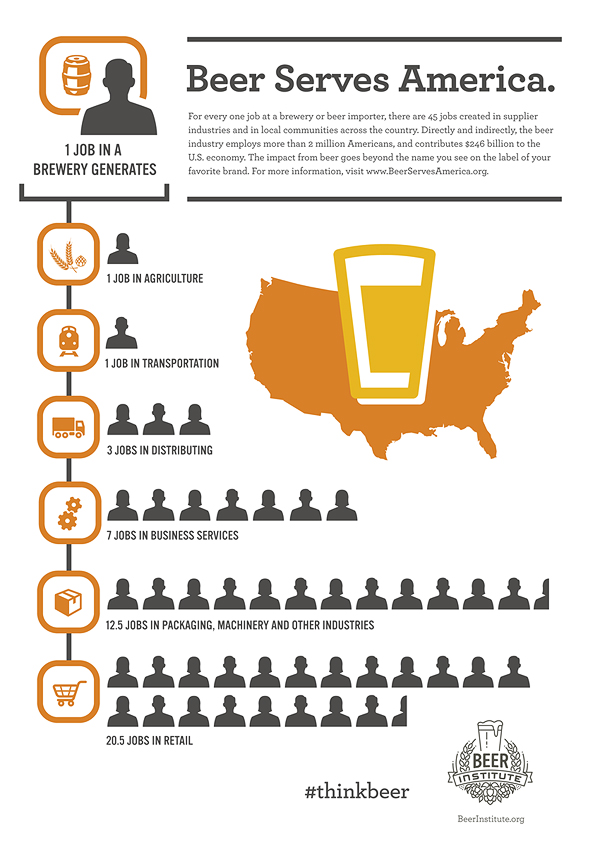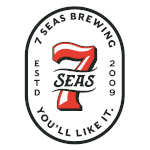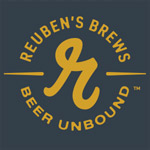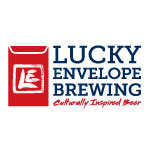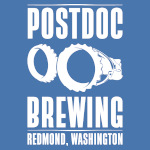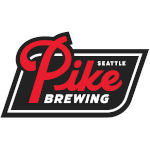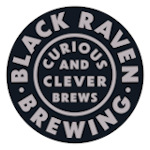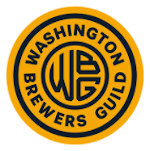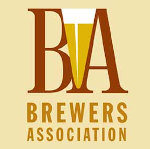For Labor Day this year, raise a toast to your local brewery and thank it for creating so many jobs while it brews your favorite libation. Each job in a brewery supports 45 jobs in other, related industries. That means Washington’s breweries support nearly 600,000 jobs. New data proves what many have surmised: breweries are job-creation machines that generate a lot of tax revenue and otherwise bolster the local and national economy.
According to a study commissioned by the Beer Institute and the National Beer Wholesalers Association, and released yesterday, one job in a brewery supports 45 jobs in other industries. The study also revealed that each year breweries contribute $246.6 billion to the nation’s economy and generated $49 billion in local, state and federal taxes. The study analyzed the entire beer industry and not just the craft beer segment of the industry.
According to the Washington Brewers Guild, craft beer’s impact on the local economy equals more than $1 billion per year. In Washington, 13,000 people work in breweries, for an average wage of $33,737. Total labor income from those jobs is $443,572,000. *
According to Beer Institute analysis, each job in a brewery supports 45 other jobs in the agriculture, business and personal services, construction, finance insurance and real estate, manufacturing, retail, transportation and communication, travel and entertainment and wholesale sectors. In other words, Washington’s 13,000 brewery jobs support a total of 585,000 other jobs.
“Today we toast to the industry’s 2 million men and women who make it possible for Americans to enjoy their favorite beer,” said Jim McGreevy, Beer Institute President and CEO. “America’s preference for beer is a huge boon to the national economy and the American worker.”
Beer & Taxes
More than 40 percent of what consumers pay for a beer goes to taxes, according to the Beer Institute. It’s not about sales tax. At the brewery, tax is the most expensive ingredient in beer, a reality that inevitably, understandably, and immediately trickles down to consumers. Much of the tax paid by breweries is in the form of the federal excise tax, which is based on production volume and is paid by all breweries across the nation on top of any state excise tax.
The Brewers Excise and Economic Relief (BEER) Act of 2013, which is currently pending in Congress and has received bi-partisan support, would reduce the federal excise tax paid by a brewery on each barrel of beer it produces. The BEER Act would eliminate the federal excise tax for most Washington breweries. For the state’s largest breweries the tax would be drastically reduced.
Specifically, the BEER Act would roll back the federal excise tax for larger breweries from $18 for every 31-gallon barrel to $9 a barrel. For brewers producing less than two million barrels annually, the rate would be reduced to $3.50 on the first 60,000 barrels; and for those brewing less than 15,000 barrels, the federal excise tax would be eliminated.
In 2013, Redhook was the only brewery in Washington to produce more than 60,000 barrels. In fact, only four breweries produced more than 15,000 (Redhook Brewery, Georgetown Brewing, Mac and Jack’s Brewery, and Elysian Brewing). See our post about Washington’s top breweries.
“Most consumers are surprised to learn that, on a national average, taxes are the most expensive ingredient in their beer,” said McGreevy. “The BEER Act would protect consumers from a hidden and outdated tax and encourage expansion and growth in an American industry that puts millions of men and women to work.”
According to BEER Act supporters, reducing or eliminating the federal excise tax promotes growth in the industry, which translates into more brewery jobs and more non-brewery jobs. Creating more jobs generates more tax revenue and more tax-paying wage earners. The impact of reducing the federal excise tax is an overall increase in tax revenue.**
The Washington Beer Blog has been reporting on the BEER Act (or the movement that would become the BEER Act) since 2010. Hopefully this is the year it become reality.
* See our previous post about beer’s impact on Washington’s economy.
** Read the report published by John N. Friedman, an economics professor at Harvard’s Kennedy School of Government, about the expected impact of the excise tax reduction.

